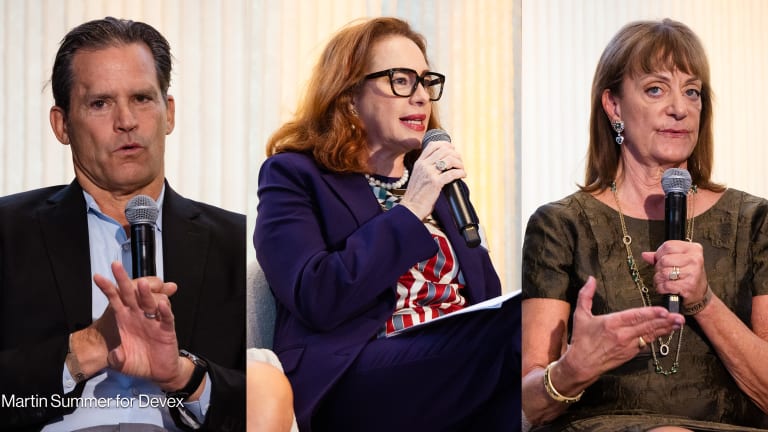
When international alcohol conglomerate Diageo took over a brewery in Sebeta, Ethiopia, most of the barley was being imported despite the fact that local small holders were producing tons of it. The company responded with an agricultural development project that would support local enterprise development, build agricultural production and capacity, and bolster the livelihoods of farmers.
When it did, Diageo also gained long-term, secure and sustainable access to raw materials, the potential for lower procurement costs, and reduced exposure to commodity market volatility and changes in resource availability.
Examples of public-private partnerships like these were presented at a Center for Strategic and International Studies event to make the case that good development and good business can be one and the same.
The panel brought leaders from company CSR programs and development agencies together to highlight the growing use of PPPs across sectors, and to point out some of the difficulties still remaining as these disparate communities draw closer.
Ten years ago, just having an equity fund in Africa was a feat, according to Papa Ndiaye, founder and CEO of Advanced Finance and Investment Group. Now, private financial flows far outstrip official development assistance to Africa.
The new paradigm shift from aid to investment can only be successful if development agencies partner with the private sector, said Agnes Dasewicz, director of U.S. Agency for International Development’s Private Capital Group for Africa, which works with U.S., African and international firms and financial institutions to facilitate greater investment that supports key development objectives.
At this point, there is more money than there are African businesses prepared to use it responsibly, Dasewicz said.
But partnerships have already proven promising if not yet successful. A PepsiCo partnership with USAID and the World Food Program in Ethiopia, for example, produced a chickpea-based nutritional supplement that could be used in place of Plumpy’nut, and should double farmers’ yields.
The product is being reviewed by the Ethiopian health ministry and Pepsi hopes to launch it later this year. Meanwhile, the company is enjoying access to a new domestic market, and building a global nutrition business set to bring in $30 billion annually.
When you serve the poor, there’s no separation between development and business, Ndiaye said.
“It’s just business.”
A cellphone company that tries to build a stadium to help develop the local community is taking the wrong approach and just adding costs, Ndiaye said. Why should development and business have to be artificially conjoined instead of one and the same?
But some on both sides still need convincing.
Government development agencies that engaged with private companies must respond to allegations of “corporate welfare”— asked why governments should put money into companies that already make huge profits.
Within some companies, the same questions arise as to whether partnerships with development organizations are really necessary.
Companies can help develop small businesses necessary for a country’s economic development, and they can make their sophisticated supply networks available to government agencies who want to distribute needed products to the poor, according to Dasewicz.
The success of USAID’s new development paradigm depended on how well it could partner with the private sector, Dasewicz added.
For businesses, partnering with development organizations bestows credibility, on-the-ground knowledge and expertise. Since shareholders tend to be limited in how far out they think, partnering with government development agencies also allows businesses to contribute to structural investments they know will take five or 10 years.
“Yes, it might be simpler to do it on our own,” said Tara Acharya, PepsiCo’s senior manager in global health and agriculture policy.
But companies lack familiarity with local needs, local capacity, how to market and how to sell, she added. They also don’t want to assume all the risk on their own.
Acharya conceded that conflicting time frames posed some difficulty when it came to marrying the short-term interests of donors and shareholders with longer-term development needs.
Employees from both communities needed training on how to identify where partners could help the most, according to Dasewicz. For that, USAID staff needed deep knowledge of the tools their own agency can bring.
They also needed regular engagement with corporations, something Dasewicz said was lacking: There is currently no systematic information-sharing taking place between development agencies and the private sector.
Read more development aid news online, and subscribe to The Development Newswire to receive top international development headlines from the world’s leading donors, news sources and opinion leaders — emailed to you FREE every business day.








